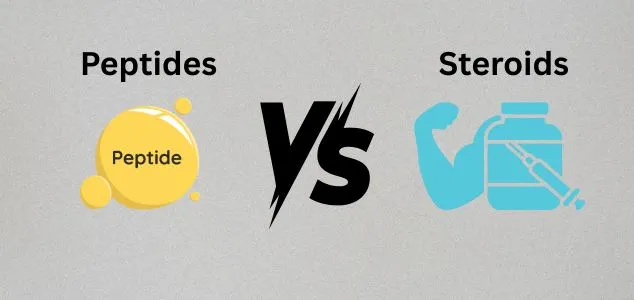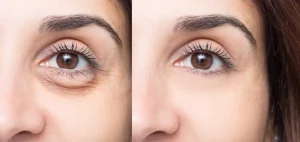What Are Peptides?
Peptides are short chains of amino acids that act as signaling molecules in the body, regulating functions like hormone secretion, tissue repair, immune response, and cell growth. Unlike steroids, peptides are hydrophilic and bind to surface receptors such as G-protein-coupled receptors (GPCRs) to trigger internal signaling cascades without entering the cell nucleus.
Some peptides, like insulin and glucagon, occur naturally, while others, like CJC-1295 or BPC-157, are synthetically engineered for performance enhancement, anti-aging, and injury recovery. Therapeutically, over 80 peptide drugs have been FDA-approved for conditions ranging from diabetes to cancer.
Because peptides typically mimic natural processes, they’re often considered safer and more targeted than anabolic steroids, though many remain classified as research chemicals.
Common types include growth hormone secretagogues (GHRPs), healing peptides, and cosmetic peptides. They are usually injected subcutaneously and require consistent dosing to maintain biological activity.
What Are Steroids?
Steroids are lipid-based compounds derived from cholesterol, structurally defined by a four-ring core. Anabolic–androgenic steroids (AAS) mimic testosterone, promoting muscle growth, recovery, and strength by binding to androgen receptors, entering the cell nucleus, and influencing gene expression.
Unlike peptides, steroids are lipophilic, meaning they can cross cell membranes and exert genomic effects. Developed in the 1930s for clinical use, steroids are now prescribed for muscle wasting, hormonal deficiencies, and delayed puberty but are also widely abused in bodybuilding.
Common compounds include testosterone enanthate, trenbolone, and Winstrol. Most anabolic steroids are classified as Schedule III substances and banned by WADA source.
While effective, steroids can cause serious side effects like HPTA suppression, gynecomastia, liver toxicity, and cardiovascular strain.
They are available in oral, injectable, and transdermal forms, often used in cycles to enhance muscle mass or cutting phases. Steroids provide rapid gains but carry higher physiological risks than peptides.
What are the differences between peptides and steroids?
While both peptides and steroids influence performance and recovery, they operate through fundamentally different biological pathways. Peptides act as signaling molecules that stimulate natural hormone production, often with fewer systemic effects. Steroids, on the other hand, directly override hormonal processes by altering gene expression, leading to faster gains but with greater physiological risks.
The choice between them often comes down to goals, tolerance for side effects, and legality, as steroids are generally controlled substances, whereas many peptides exist in regulatory grey zones.
| Peptides | Steroids | |
| Biological Nature | Peptides are short chains of amino acids. | Steroids are lipid-based compounds derived from cholesterol. |
| Mechanism of Action | Peptides bind to cell-surface receptors to trigger natural hormone release. | Steroids bind to nuclear receptors and directly alter gene expression. |
| Muscle Growth | Peptides promote gradual lean muscle development. | Steroids rapidly increase muscle mass through anabolic activity. |
| Hormonal Impact | Peptides support natural hormone rhythms. | Steroids suppress natural testosterone production. |
| Side Effects | Peptides have mild, localized or metabolic side effects. | Steroids can cause severe systemic side effects including organ damage. |
| Administration | Peptides are typically injected subcutaneously. | Steroids are taken orally or via intramuscular injection. |
| Fat Loss | Peptides indirectly support fat loss via GH stimulation. | Steroids promote direct fat burning through androgenic effects. |
| Recovery Support | Peptides accelerate healing and tissue repair. | Steroids enhance protein synthesis and recovery but stress organs. |
| Legality | Some peptides are legal but sold as research chemicals. | Steroids are controlled substances and often illegal without a prescription. |
| Sports Ban Status | Most performance-enhancing peptides are banned in pro sports. | All anabolic steroids are banned in professional sports. |
| Long-Term Risk | Peptides lack long-term research but are considered lower risk. | Steroids carry well-documented long-term health risks. |
| Use Case | Peptides are used for anti-aging, recovery, and moderate enhancement. | Steroids are used for aggressive muscle and strength gains. |
What are the benefits of peptides and steroids?
| Benefit | Peptides | Steroids |
| Muscle Growth | Help your body naturally produce more growth hormone, leading to steady, lean muscle gains. | Quickly build muscle mass and strength by directly increasing muscle-building hormones. |
| Fat Loss & Metabolism | Boost your metabolism and help burn fat, especially around stubborn areas. | Can help burn fat but may also lead to water retention or hormonal imbalances after stopping. |
| Recovery & Healing | Speed up recovery from workouts and injuries, especially for joints, tendons, and soft tissues. | Improve muscle recovery, but may not support tendon or joint healing as well. |
| Anti-Aging & Longevity | Support better sleep, skin quality, energy levels, and natural hormone balance as you age. | Not commonly used for aging; long-term use may speed up some aging processes. |
| Performance & Endurance | Help improve energy, stamina, and overall workout performance over time. | Increase strength and aggression quickly, but may reduce endurance or lead to faster fatigue. |
| Skin, Joint & Tissue Health | Promote smoother skin, stronger joints, and faster recovery from inflammation or overuse. | May cause acne or oily skin; added muscle mass can put stress on joints. |
| Hormone Impact | Work with your body to gently increase hormone levels without shutting natural production down. | Can shut down your body’s natural testosterone, needing “post-cycle therapy” to recover afterward. |
When to consider peptides or steroids
If your goals involve fat loss, improved recovery, anti-aging, injury repair, or modest lean muscle gain especially if you want a safer, gradual approach that works with your body’s natural processes. Peptides are also a good choice if you’re prioritizing long-term health, minimal side effects, or are exploring hormone optimization for wellness rather than extreme performance.
Consider steroids only if you’re seeking rapid and significant muscle growth, strength gains, or competitive performance enhancement and understand the legal, medical, and hormonal risks involved. Steroids may be considered under medical supervision for conditions like low testosterone (hypogonadism) or muscle-wasting diseases, but recreational use comes with much higher health stakes.
Ultimately, peptides are ideal for those who want to optimize, recover, or age better while steroids are used for short-term intensity with long-term trade-offs.
Risks and side effects
Peptides and steroids can both improve performance or appearance, but they also come with side effects and deeper risks that deserve serious attention.
Peptides are generally considered milder in terms of side effects. Common short-term issues include bloating, joint stiffness, numbness in extremities, headaches, or injection site redness. Some people also report changes in sleep quality or appetite, especially with growth hormone related peptides.
While these side effects are usually manageable, the bigger concern lies in product quality and regulation; many performance peptides are sold as research chemicals, not FDA-approved drugs. That means purity, safety, and dosing accuracy aren’t guaranteed, especially if purchased online without medical oversight.
Steroids, on the other hand, come with both more intense side effects and higher long-term risks. Common side effects include acne, hair loss, mood swings, aggression, and in women, voice deepening or facial hair growth. But more serious risks can involve testosterone shutdown, infertility, liver strain, heart issues, gynecomastia (male breast tissue), and blood pressure problems. Long-term misuse has been linked to cardiovascular disease, kidney damage, and other irreversible conditions.
Unlike most peptides, anabolic steroids are classified as Schedule III controlled substances in the U.S., and using them without a prescription is illegal. While some clinical steroids are FDA-approved for legitimate medical conditions (like testosterone replacement therapy), their recreational use carries medical and legal consequences.
Which One Is Safer or More Effective?
Peptides are safer than steroids because they work by supporting your body’s natural hormone signaling rather than overriding it. This results in fewer serious side effects, minimal disruption to endogenous hormone production, and lower risks to organs like the liver and heart. Steroids introduce synthetic hormones that can suppress natural testosterone, strain multiple organ systems, and lead to long-term health complications especially when used without medical supervision.
How long do peptides take to work vs steroids?
Peptides usually take 3 to 12 weeks to show noticeable effects, depending on the type, dose, and goal. For example:
- Growth hormone–related peptides (like CJC-1295 or Ipamorelin) may start improving sleep, fat loss, and recovery within a few weeks — but muscle growth or body composition changes often take 2–3 months.
- Healing peptides (like BPC-157) may start reducing inflammation or pain in a few days to a couple of weeks.
- Anti-aging peptides show gradual changes over months.
That’s because peptides stimulate your natural biological processes, so their results tend to be slower but more sustainable.
Steroids, in contrast, work much faster — with visible muscle and strength gains often appearing in 1 to 3 weeks.
- Oral steroids (like Dianabol) kick in within days.
- Injectable steroids (like Testosterone Enanthate) usually begin showing results in 7–14 days, with full effects by week 4 or 5.
- However, the faster the onset, the more aggressive the hormonal disruption tends to be.
Steroids don’t rely on your body’s natural processes — they override them, which is why results are rapid but come with more risk.
How much does peptides and steroids cost in NYC?
Peptide therapy in Manhattan typically ranges from $150 to $2,000 per month, depending on the peptide type and your treatment goals. Wellness peptides like those for energy or weight loss are more affordable, while advanced options like CJC-1295, Ipamorelin, or BPC-157 cost more due to personalized dosing and compounding.
Unlike unregulated steroids, peptides are safer, medically guided, and legal. At Dr. Syra Aesthetics, we offer a $300 consultation that includes lab work, health history review, and a customized treatment plan. For those considering peptide therapy, we recommend starting with a free consultation call at +1-646-912-8020 or visiting us at 492 6th Avenue, New York, NY 10011.
Can Peptides Be Stacked with Steroids?
Yes, peptides can be stacked with steroids, to enhance benefits while mitigating some of the downsides of steroid use.
Peptides like Ipamorelin, BPC-157, or TB-500 are sometimes used during or after a steroid cycle to support recovery, healing, joint health, and natural hormone restoration. Others like CJC-1295 may help maintain growth hormone levels while minimizing the overall steroid dosage.
However, stacking increases complexity and potential risk especially if done without medical guidance. Hormonal overlap, improper timing, or dosing errors can disrupt endocrine balance or reduce results. It should only be done with professional supervision and a clear understanding of goals, interactions, and side effects.
Is epinephrine a steroid or peptide hormone?
Epinephrine is neither a steroid nor a peptide hormone — it is a catecholamine derived from the amino acid tyrosine, functioning as both a hormone and neurotransmitter.
Is growth hormone a steroid or peptide?
Growth hormone is a peptide hormone, not a steroid. It is made of 191 amino acids and is naturally produced by the pituitary gland to regulate growth, metabolism, and cell regeneration.
Can peptides build muscle like steroids?
Peptides can help build muscle, but not as rapidly or dramatically as steroids. They work by stimulating natural growth hormone release, supporting lean muscle gain over time with fewer side effects.
Are peptides legal?
Peptides are legal when prescribed for medical use, such as hormone therapy or injury recovery. However, many performance-enhancing peptides are sold as research chemicals and are not FDA-approved for human use, making their legal status unclear or restricted depending on the country and use case.
Do peptides show up on a drug test?
Yes, certain peptides can show up on a drug test, especially in competitive sports. Anti-doping agencies like WADA specifically test for banned peptides used for performance enhancement, including growth hormone–releasing peptides.
References:
https://pmc.ncbi.nlm.nih.gov/articles/PMC12313605/
https://www.ncbi.nlm.nih.gov/books/NBK305894/
https://www.nature.com/articles/s41392-024-02107-5
https://pmc.ncbi.nlm.nih.gov/articles/PMC4026349/

About The Author
Dr. Syra Hanif M.D.
Board Certified Primary Care Physician
Dr. Hanif is the Director of Aesthetic Medicine. She is a board-certified physician in Aesthetic Medicine who specializes in using non-surgical alternatives in order to enhance one's appearance through Botox and fillers.
Read More











